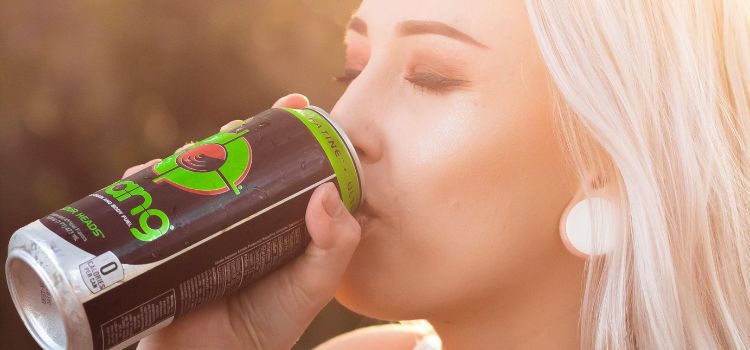Searching for the best energy drink to keep you alert during long drives? Whether you’re hitting the road for a cross-country journey or just need a pick-me-up during your daily commute, finding the right energy drink can make all the difference.
In the realm of energy drinks, taste and functionality are key considerations. You want something that not only provides a boost of energy but also tastes great without the guilt of added sugars or carbs. That’s where the most delicious sugar-free energy drinks shine. Remaining vigilant while driving is essential for safety.

That’s why we’ve curated a list of the best-tasting zero-sugar energy drinks that are specifically designed to keep you alert and focused while driving. From fruity flavors to crisp, refreshing options, there’s something for every palate.
Say goodbye to grogginess and hello to sustained energy with the best low-carb energy drink options on the market. With these beverages by your side, you can conquer the open road with confidence and clarity. Stay safe and energized on your journey with the perfect energy drink companion.
Best Energy Drink Comparison 2024
Product Name | Brand | Caffeine | Benefits | Price |
CLEAN Cause Energy Drinks | CLEAN Cause | 160mg | support addiction recovery, focus | |
Drink Update Energy Drink | Update | Caffeine Free | helps Uncompromising focus, utilize Paraxanthine | |
Gorilla Mind Energy Drink | Gorilla Mind | 200mg | Unmatched Energy, Amplified Focus | |
Lost and Found Energy Drink | Lost and Found Energy | 150mg | support Energy & Focus | |
GHOST Energy Drink | GHOST | 200mg | support brain and cognitive function, energy | |
CELSIUS Raspberry Acai Energy Drinks | CELSIUS | 200mg | support functional, Essential Energy | |
Cocaine Energy Drink | 51FIFTY Energy Drink | 280 Mg | support overall health and energy production | |
Rockstar Focus Energy Drink | Rockstar | 200mg | Energy & Mental Boost |
Top 10 Energy Drinks to stay awake while driving
Discover the Top 10 Best Energy Drinks meticulously crafted to keep you alert and focused during long drives, ensuring safety and vitality on the road.
CLEAN Cause Energy Drinks
CLEAN Cause’s Low-Calorie Variety Pack Sparkling Yerba Mate Tea is a refreshing energy boost with 160mg of naturally sourced caffeine from Fair Trade Yerba Mate. Certified USDA Organic ingredients ensure a guilt-free indulgence with only 60 calories per serving and minimal sugar content.
What’s more, 50% of net profits or 5% of net revenues (whichever is greater) are dedicated to supporting addiction recovery, making every sip a meaningful contribution to a worthy cause. Whether you’re tackling big waves, conquering hills, or pushing through workouts, CLEAN Cause provides the fuel you need to power your hustle. Plus, with a 100% satisfaction guarantee, you can sip confidently knowing that if you’re not satisfied, they’ll make it right.
Pros
Cons
Alani Nu JUICY PEACH Energy Drinks
Alani Nu’s JUICY PEACH Sugar-Free, Low-Calorie Energy Drinks are a delicious way to kickstart your day without the sugar crash. Packed with 200mg of caffeine and essential B vitamins like B5, B6, and B12, these drinks provide a natural energy boost to keep you going. Biotin adds an extra glow while maintaining steady energy levels.
With irresistible flavors and just 15 calories per can, you can enjoy it without any guilt. Plus, they’re vegan, gluten-free, and free from artificial colors, aligning with wellness goals. Founded by Katy Hearn in 2018, Alani Nu focuses on delivering low-calorie products with unique flavors, perfect for health-conscious consumers.
Please be aware that these products are not appropriate for children, individuals with caffeine sensitivity, pregnant women, or nursing mothers. Choose Alani Nu Energy for a refreshing pick-me-up anytime, anywhere.
Pros
Cons
Drink Update Energy Drink
Introducing Energy Evolved – Update, the game-changer in energy drinks. Powered by Paraxanthine, a revolutionary energy source derived from caffeine, it delivers a clean, sustained energy boost without the crash or jitters.
Supported by scientific research, Update enhances focus, ensuring peak performance without distractions. But that’s not all – Update prioritizes health with its sugar-free formula, sweetened naturally with stevia and allulose.
Say goodbye to artificial sweeteners and hello to guilt-free energy. And the taste? It’s simply delicious. With four unique flavors to choose from, each lightly carbonated and bursting with flavor, Update offers a refreshing experience tailored to your preferences. Upgrade your energy game with Energy Evolved – Update and embrace a new era of productivity and vitality.
Pros
Cons
Gorilla Mind Energy Drink
Gorilla Mind Energy isn’t your typical energy drink—it’s a powerhouse of over 2000 mg of nootropics designed to supercharge your cognitive function. Unlike other drinks that rely solely on caffeine, Gorilla Mind targets key pathways in the brain, delivering unparalleled focus, energy, and mental clarity.
But it’s not just about what’s inside the can; Gorilla Mind boasts an impressive lineup of 16 delicious flavors, proving that health-conscious choices don’t have to compromise on taste. Plus, with no sugar or artificial colors, it’s a guilt-free indulgence for even the most discerning consumer.
What sets Gorilla Mind apart is its commitment to quality. Every batch undergoes third-party testing, ensuring that only the purest ingredients make it into their premium formula. If you’re tired of the same old energy drinks, Gorilla Mind Energy offers a refreshing alternative—a drink that not only tastes great but also delivers the boost you need without the crash.
Pros
Cons
Lost and Found Energy Drink
Introducing Lost and Found Energy Drink: the go-to boost for your busy lifestyle. With a potent mix of caffeine, taurine, and electrolytes, it’s the sugar-free, artificial flavor-free solution to keep you powering through without the dreaded jitters or crashes. But it’s not just about function; it’s about flavor too.
Dive into a range of delicious tastes, all without the guilt of added sugar or artificial additives. Each sip promises a satisfying experience that fuels your body and delights your taste buds. Whether you’re in the midst of intense gaming sessions, deep study sessions, or just navigating the challenges of everyday life, Lost and Found Energy Drink has your back.
Plus, its commitment to transparency means you always know exactly what you’re getting with every can. Discover Lost and Found Energy Drink today for a refreshing burst of energy, flavor, and peace of mind in every sip.
Pros
Cons
GHOST Energy Drink
Introducing GHOST Energy: the energy drink revolutionizing the market with its fully transparent, fully loaded formula. What sets GHOST Energy apart is its legendary energy source, providing 200mg of Natural Caffeine from coffee beans.
This provides a pleasant, uplifting energy boost without the jitteriness or crashes often linked to other caffeinated beverages. But it’s not just about energy; GHOST Energy also offers epic focus, thanks to its blend of potent nootropics.
From Carnipure L-carnitine to Neurofactor, these ingredients support brain function, enhance cognitive abilities, and aid in nutrient absorption. Despite its benefits, GHOST Energy isn’t without its drawbacks. With its high caffeine content, it’s not suitable for minors, and limited flavor options may disappoint some consumers. However, for those seeking a natural, effective energy boost with complete transparency, GHOST Energy is a top contender.
Pros
Cons
CELSIUS Raspberry Acai Energy Drinks
CELSIUS isn’t your average energy drink—it’s a lifestyle upgrade. Packed with premium ingredients and essential vitamins, CELSIUS offers a healthier alternative to traditional energy drinks. Additionally, it is free from sugar, genetically modified organisms (GMOs), animal-derived ingredients, and gluten, and it holds Kosher certification, making it suitable for various dietary requirements.
Powered by the exclusive MetaPlus blend, CELSIUS fuels your workouts with green tea extract, guarana seed extract, and essential vitamins like C and B. It’s the ultimate pre-workout boost, supporting energy production, immune health, and hunger control.
Indulge in the delicious Raspberry Acai Green Tea flavor, a refreshing blend of sweet raspberries and tangy acai, perfect for staying energized on the go. With clinically proven ingredients and a non-carbonated formula, CELSIUS strikes the right balance between taste and performance.
Available in convenient 12 oz. slim cans, CELSIUS is your go-to beverage for Essential Energy. Elevate your everyday routine with CELSIUS and fuel your active lifestyle to the fullest.
Pros
Cons
Cocaine Energy Drink
Introducing an energizing Peach Mango flavored drink, specially crafted to give you a lasting boost. Packed with 280 mg of caffeine per 12oz can, it’s the perfect pick-me-up to fuel your day. But it’s not just about the caffeine kick – this drink is enriched with essential vitamins B and C to support your overall health and energy levels.
Craving something sweet? This delicious Peach Mango flavor satisfies those cravings while providing the energy you need to power through your day. And with its convenient 12-pack packaging, you’ll always have a stash ready for whenever you need a lift. Say goodbye to midday slumps – these drinks will keep you energized from morning to night. Try it today and experience the rush of long-lasting energy!
Pros
Cons
Rockstar Focus Energy Drink
Introducing the newest addition to the Rockstar family: Rockstar Focus Energy Drink in Watermelon Kiwi flavor! Packed with 12 cans of 12 ounces each, this drink is your go-to for a boost of energy and mental clarity. What sets it apart? It’s made with a lion’s mane for that extra mental edge.
But here’s the kicker: zero calories and zero sugar. That’s right, guilt-free energy in every sip! With 200 milligrams of caffeine in each can, you’ll be prepared to handle whatever challenges come your way.
Whether you’re gearing up for a busy day at work, hitting the books for a study session, or getting ready to crush your workout, Rockstar Focus Energy Drink has your back. So go ahead, seize the day with sustained energy and focus, and make every moment count!
Pros
Cons
Black Rifle Coffee Energy Drink
Introducing Black Rifle Coffee’s newest creation: 300, a line of Ready to Drink coffee packed with 100% Colombian beans and a whopping 300mg of caffeine per can. With added MCT Oil and amino acids, it promises a potent energy boost on the go.
Choose from two delicious flavors, Caramel Vanilla, and Rich Mocha, for a satisfying taste experience. For coffee aficionados, Black Rifle Coffee offers a variety of roasts to suit every preference, ensuring a consistently smooth and bold cup of java.
What distinguishes them is their dedication to aiding veterans and active service members. As a company owned and operated by veterans, they proudly give back to those who serve, with a portion of proceeds dedicated to supporting veterans, first responders, and law enforcement officers.
With Black Rifle Coffee’s 300, you’re not just getting a top-notch caffeine fix – you’re also supporting a noble cause and enjoying the best in American convenience and flavor.
Pros
Cons
Buying Guide
Caffeine Content: The primary ingredient in most energy drinks is caffeine, which acts as a stimulant to help increase alertness and reduce fatigue. However, the caffeine content can vary significantly between different brands and products.
It’s essential to choose a drink with an appropriate amount of caffeine to keep you awake without causing jitteriness or nervousness. Look for products with moderate caffeine levels, typically ranging from 80 to 150 milligrams per serving.
Sugar Content: Some energy drinks are loaded with sugar, which can provide a quick energy boost but may lead to a subsequent crash. Excessive sugar consumption can also result in weight gain and various health issues. Opt for drinks with lower sugar content or choose sugar-free options to avoid potential negative effects.
Calorie Count: Energy drinks can be calorie-dense, especially those that contain sugar or high-fructose corn syrup. If you’re watching your calorie intake, consider selecting a low-calorie or zero-calorie energy drink to avoid unnecessary calories while still benefiting from the caffeine boost.
Taste and Flavor: The taste and flavor of an energy drink can vary widely between brands and products. Some people prefer fruity or citrusy flavors, while others may prefer more traditional options like cola or lemon-lime. Choose a drink with a flavor that you enjoy to ensure that you’ll want to consume it while driving.
Price and Accessibility: Energy drinks can vary widely in price, depending on the brand, size, and location of purchase. Consider your budget and how often you’ll be purchasing energy drinks to stay awake while driving.
Frequently Asked Questions
The Mayo Clinic recommends that most healthy adults limit their caffeine intake to 400mg per day, approximately equivalent to four 8-ounce cups of brewed coffee.
No, energy drinks should not be used as a substitute for adequate rest. Even though they may briefly increase alertness, nothing can substitute for the advantages of a restful night’s sleep.
Excessive consumption of energy drinks can lead to caffeine overdose, dehydration, and heart complications. It’s essential to use them in moderation and be mindful of personal health conditions.
The duration of the energy boost varies depending on factors like caffeine tolerance, metabolism, and overall health. Generally, the effects of caffeine can last anywhere from 3 to 6 hours.
While energy drinks can increase alertness temporarily, they may not necessarily improve driving skills. It’s crucial to remain vigilant and focused behind the wheel, regardless of energy drink consumption.
Conclusion
Selecting the best energy drink to stay awake while driving requires careful consideration of caffeine content, additional ingredients, and personal preferences. While energy drinks can provide a temporary energy boost, drivers must use them responsibly and prioritize safety on the road. By following safety tips and understanding the potential risks, drivers can stay alert and focused during long journeys.












